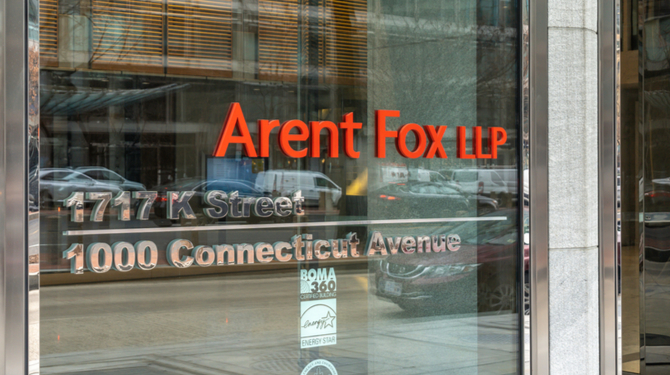Sign up for our free daily newsletter
YOUR PRIVACY - PLEASE READ CAREFULLY DATA PROTECTION STATEMENT
Below we explain how we will communicate with you. We set out how we use your data in our Privacy Policy.
Global City Media, and its associated brands will use the lawful basis of legitimate interests to use
the
contact details you have supplied to contact you regarding our publications, events, training,
reader
research, and other relevant information. We will always give you the option to opt out of our
marketing.
By clicking submit, you confirm that you understand and accept the Terms & Conditions and Privacy Policy
American law firms have been on a global expansion spree for much of the past thirty years, but globalisation has taken a beating lately, with rising tides of nationalism and protectionism, geopolitical tensions not seen since the Cold War, a new, savage land war in Europe and, not least of all, the pandemic-induced perception that remote working dispenses with the need for offices in remote locales.
How did this affect US law firms’ view of the global market, and what can we expect this year? And as these firms watch their peers (nearly a dozen US firms, all of the Magic Circle and more) closing up shop in Russia in quick succession and distancing themselves from Russian business, are we seeing the end of international law firm expansion?
Not by a long shot.
Recent merger activity
Among the more notable mergers or takeovers announced by US aw firms during the past two years, (Troutman Sanders/Pepper Hamilton, Holland & Knight/Thompson & Knight, Duane Morris/Satterlee Stephens, Crowell & Moring/Kibbe & Orbe, Arent Fox/Schiff Hardin), there was barely a hint of the need for an international presence being a driver for the deal. (Armstrong Teasdale's 2021 combination with the UK's Kerman & Co. was the exception.)
Of course, the US is an enormous legal market, and law firms have been busy building out in an ever-increasing roster of domestic locations, including Salt Lake City, Phoenix, Las Vegas, Nashville, Birmingham (Alabama), Boulder (Colorado), Portland (Oregon), Minneapolis, Cleveland and others, not to mention a veritable stampede to the West Coast. But international focus has lagged, except for those firms already well-established in the cross-border space.
Clients operate and thrive in a global market. So must their lawyers
Moreover, for most large US firms the pandemic years have been extraordinarily profitable. In part this is due to Covid-related cost cutting, but it also reflects the tsunami of cash pouring into private equity and M&A deals, and vibrant practices from funds to fintech, healthcare, private client, energy and renewables, intellectual property, life sciences, technology, regulatory and lobbying.
Domestic focus and strong financial results illustrate both the risks and the opportunities for US firms. The risk is short-termism that says: 'We're doing too well to worry about the rest of the world.' This kind of thinking harks back to pre-globalisation days, when American law firms, with a few exceptions, had the (imagined) luxury of not having to feel connected to the outside world. Today it's a great way to get left behind.
The opportunity is to take advantage of strong performance now, by formulating strategies that acknowledge the interconnectedness of the world’s economy. Clients operate and thrive in a global market. So must their lawyers.
If there were ever a need to illustrate this, it would be hard to find a better example than what we are seeing unfold in the wake of the Russian invasion of Ukraine. The unprecedented ability of governments, regulators and business to coordinate an economic response to Russia’s aggression – and the immediate effects of that response – amply demonstrate the near-universal interdependence of our global economic framework.
International expansion
The point has not been lost on major US players with established international profiles. These firms have been aggressively growing their cross-border footprint. Simpson Thacher, Kirkland & Ellis, Fried Frank, Hogan Lovells, Boies Schiller Flexner, Orrick, McDermott Will & Emery, Kobre & Kim and Quinn Emanuel among others have entered, variously, Brussels, Dublin, Milan, Singapore, Dubai and Riyadh over the past year. Many other global US players also grew their existing operations throughout Europe, Asia, the Middle East and Africa.
This trend will continue and, with Covid-19 receding, probably accelerate.
Although the war in Ukraine, inflation and greater regulatory scrutiny may slow the private equity juggernaut in Europe, US firms will continue to bulk up in London and grow their offices in Germany, France and Spain for transactional, antitrust and regulatory work, as well as investigations and disputes.
Luxembourg still looks good for tax and funds, the Nordics for environmental and ESG, and Italy for private wealth, disputes and labor and employment. The Netherlands is becoming a favoured class action locale, and this will draw US plaintiff/claimant firms, as well as defence practices.
Firms affected by the war will seek to rebalance and reposition the loss of their Russia and Ukraine practices elsewhere, and we may be seeing renewed interest in Warsaw, Bucharest and Vienna.
China
China has lost its luster insofar as new entrants are concerned, but firms already well-positioned there will be taking on more local staff. Hong Kong remains a finance, fintech, cyber, private equity and disputes destination, although global firms there are beginning to pivot more toward mainland China business (and increasingly hiring locally). US firms, particularly relative newcomers, will be cautious there, and some may be expected to pull out before long.
US firms will continue to find Singapore attractive, including as a Hong Kong alternative, given the city state’s strengths in disputes, investment funds, asset management, energy and private wealth, its draw as a business-friendly headquarters location for global clients, and its position as a gateway to other Southeast Asian countries.
The Middle East presents growth opportunity for construction, energy, disputes, life sciences and technology practices, with Dubai, Saudi Arabia and Israel likely new entry points for American firms.
Emerging markets
US firms have yet to make meaningful incursions into Africa, where UK, French and Portuguese firms have acted with greater alacrity, but we will see more interest in South Africa and in potential bright stars like Ghana, for projects, energy, infrastructure and TMT. And in Latin America, US firms will largely continue to work on a fly-in-fly-out basis, rather than open new offices, with the possible exception of Mexico. The bloom is off the rose for formerly well-regarded, business-friendly locations like Colombia, Chile and Peru.
Supply chains shift, trade policies evolve, regulators extend their reach, governments assert their local interests and even war rears its ugly head, but the global economy adapts and evolves. Its message is simple: You’ve got to be in it to win it. This year will see more US firms seeing the wisdom in that.
Robert Bata is the founder and principal of the consultancy WarwickPlace Legal
Email your news and story ideas to: [email protected]










